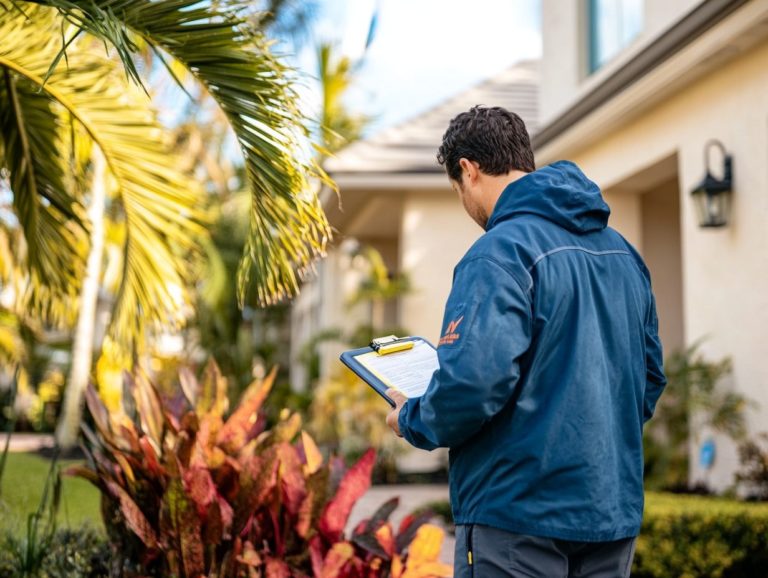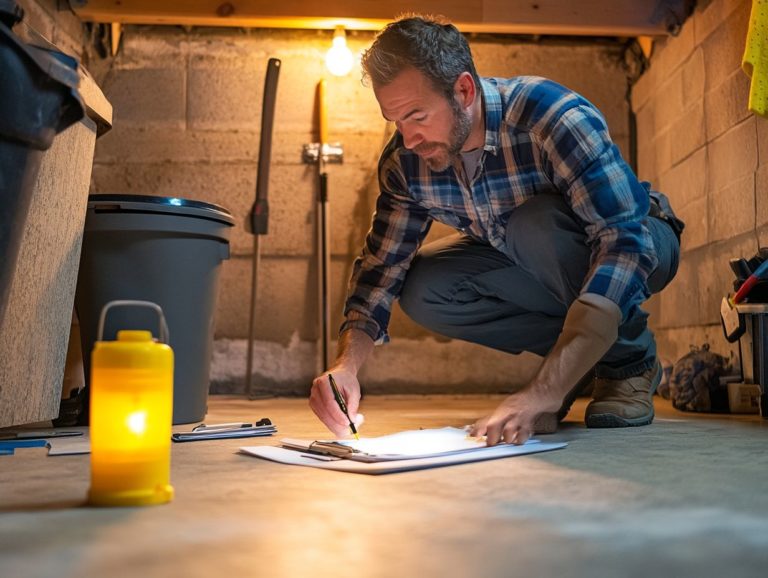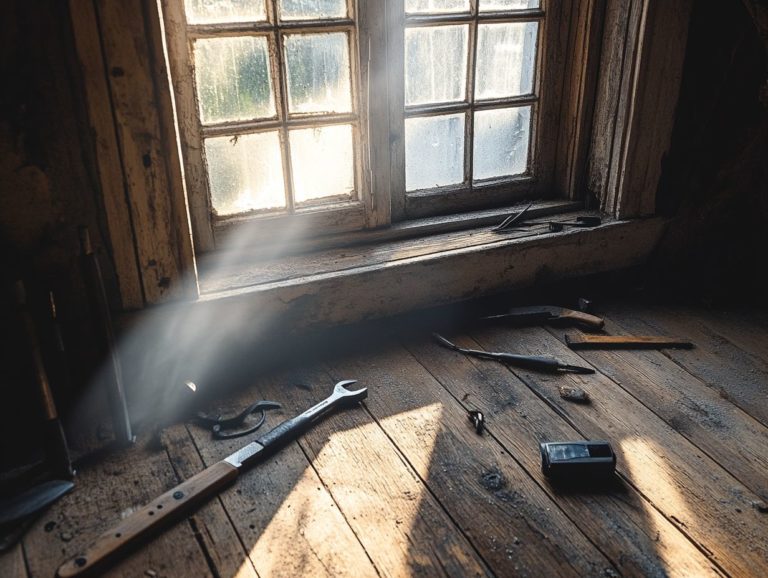5 Key Components of Effective Home Inspections
Buying a home is one of the most significant investments you ll ever make. Ensuring its condition is vital. A thorough home inspection acts as your safety net against unexpected repairs and costly surprises lurking around the corner.
This article dives into five key components of an effective home inspection. It guides you through examining the exterior and interior, assessing structural integrity, and evaluating major systems. You ll learn about common issues that can arise, the benefits of a pre-purchase inspection, and how to find a qualified inspector to meet your needs.
Dive in and empower yourself with knowledge that can safeguard your investment and provide peace of mind.
Contents
- Key Takeaways:
- 1. Inspecting Your Home’s Exterior: What You Need to Know
- 2. A Detailed Examination of the Home’s Interior
- 3. Analyzing Your Home’s Structural Components
- 4. Testing of the Home’s Major Systems
- 5. A Comprehensive Report with Findings and Recommendations
- What Is a Home Inspection and Why Is It Important?
- Frequently Asked Questions
- What are the 5 key components of effective home inspections?
- Why is structural integrity an important component of home inspections?
- What is included in an electrical systems inspection?
- Why is it necessary to inspect plumbing systems during a home inspection?
- What should be included in a heating and cooling systems inspection?
- What does an interior and exterior features inspection include?
Key Takeaways:
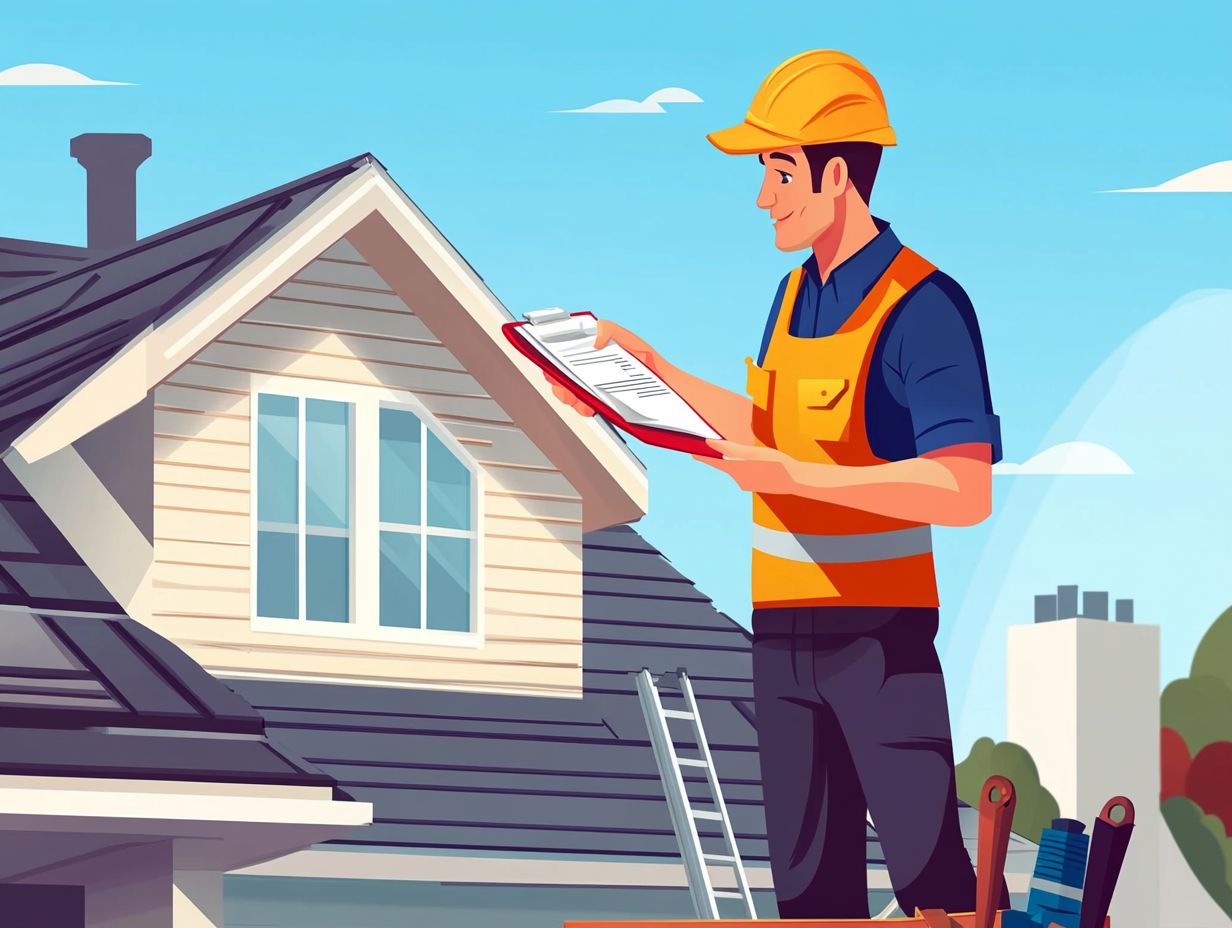
Thoroughly inspecting the exterior of a home is crucial for identifying potential issues with the foundation, roof, and overall structure, and knowing the 5 things to know about home inspections can be very helpful in this process.
An in-depth examination of the interior reveals hidden issues with plumbing, electrical, and other systems.
Analyzing the structural components, such as beams and foundations, helps prevent costly repairs in the future.
1. Inspecting Your Home’s Exterior: What You Need to Know
A thorough inspection of your home’s exterior is essential for identifying defects and safety hazards that could affect the home’s condition and worth. Following the 5 steps to a successful home inspection can help ensure no detail is overlooked.
Carefully examine aspects such as foundation stability, roof condition, and signs of water damage. This helps you understand the home’s current state and anticipate future repairs.
This meticulous approach not only protects you from unexpected expenses but also equips real estate agents with critical information for negotiations.
Recognizing the importance of these inspections allows you to make informed decisions, boosting your confidence during the home-buying journey.
With a comprehensive exterior inspection, you can make a wise investment, safeguard your financial interests, and enhance the property s long-term value.
2. A Detailed Examination of the Home’s Interior
A thorough examination of the home’s interior is crucial for uncovering plumbing issues, electrical system quirks, and HVAC (Heating, Ventilation, and Air Conditioning) performance concerns any of which could lead to buyer’s remorse if overlooked.
Pay special attention to areas like the kitchen, where outdated appliances and hidden leaks might cause significant headaches in the future.
Bathrooms also deserve focus, as water damage, mold growth, and faulty fixtures can become costly burdens if not identified early.
Don’t forget to inspect the basement for signs of moisture intrusion or structural concerns that may go unnoticed.
Trust these vital assessments to qualified home inspectors, such as those from AmeriSpec and Blue Ladder Home Inspections, to ensure a comprehensive evaluation. This due diligence provides invaluable peace of mind before making an important commitment.
3. Analyzing Your Home’s Structural Components
Analyzing the structural components is essential for uncovering hidden issues such as foundation and roof problems. Left unchecked, these could escalate into significant maintenance headaches and costly repairs.
Examine every part of the home, including walls, ceilings, and foundations, to ensure stability and prevent expensive complications. For those interested in this field, understanding the must-have qualifications for home inspectors is crucial to ensure the safety and comfort of those living there.
By following best practices recommended by the National Association of Realtors, you can gain a thorough understanding of any existing concerns. Engaging professional inspectors to evaluate structural integrity allows you to spot potential red flags early, enabling informed investment decisions.
Don t miss out! Schedule your home inspection today to empower yourself and safeguard your future.
4. Testing of the Home’s Major Systems
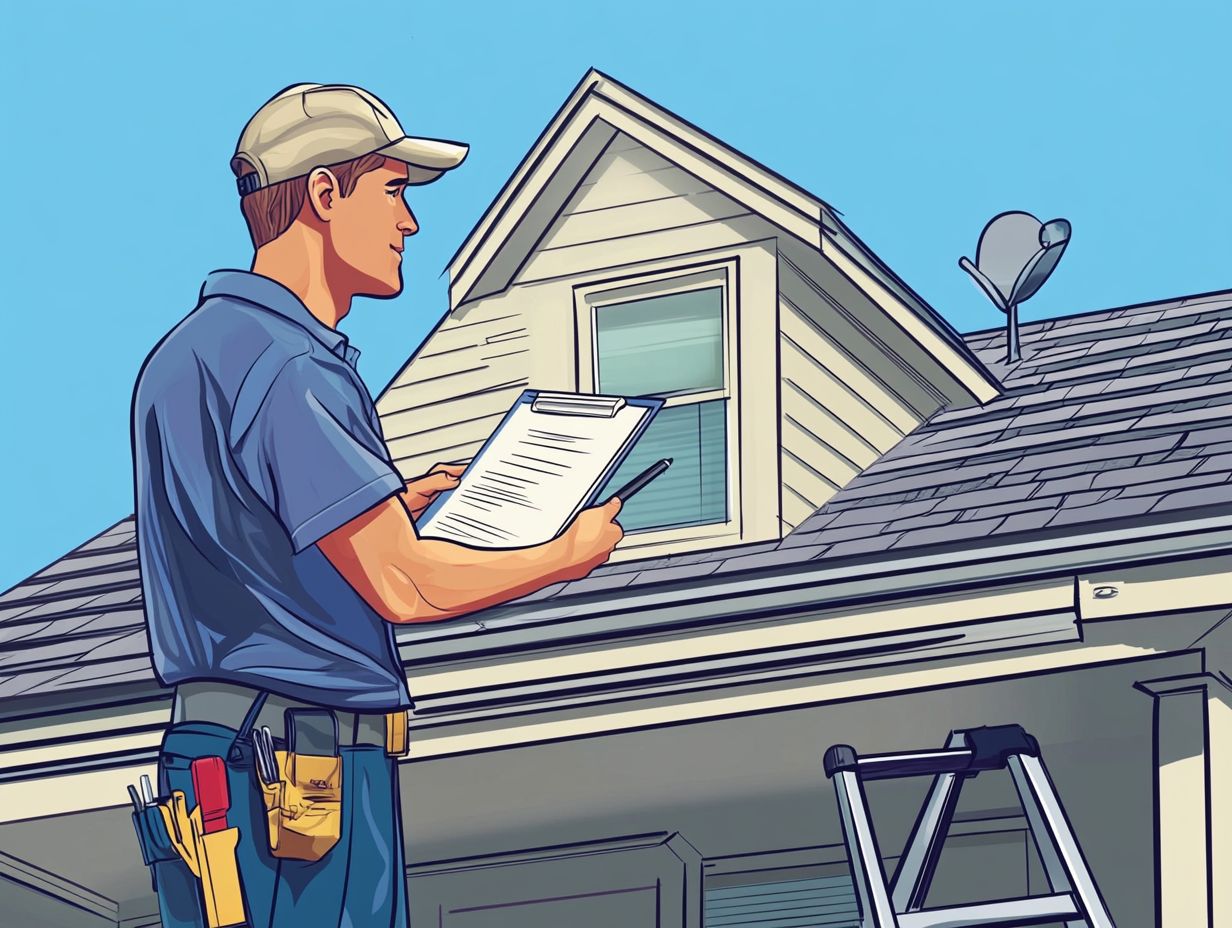
Testing the home’s major systems such as the HVAC (Heating, Ventilation, and Air Conditioning), plumbing, and electrical systems is essential for assessing safety hazards. This ensures everything operates smoothly.
As you navigate this process, pay attention to specific signs of wear. Unusual noises from the HVAC system, leaks in the plumbing, or flickering lights in the electrical setup can all be clear signs of underlying issues.
Address these issues right away to avoid serious problems later! If these aren’t addressed promptly, they could escalate into significant safety concerns or lead to costly repairs in the future.
A thorough inspection report is crucial at this stage. It documents your findings and highlights potential risks, enabling you to make informed decisions about repairs or maintenance.
This overview is essential for maintaining safety in your home.
5. A Comprehensive Report with Findings and Recommendations
A comprehensive report that encompasses findings and recommendations from the home inspection serves as an invaluable resource for you and your real estate agent. It guides you through repair costs and helps to avoid buyer’s remorse.
This detailed document not only brings to light existing issues within the property but also offers actionable solutions. It enables you to grasp the full scope of necessary repairs.
During contract negotiations, it can be a game-changer. This report provides you with leverage to request concessions or renegotiate the price based on the inspection results.
It establishes clear contingencies regarding repairs, ensuring that both you and the seller have a mutual understanding of the necessary work before sealing the deal. By addressing these concerns upfront, you foster transparency and pave the way for a smoother transaction overall.
What Is a Home Inspection and Why Is It Important?
A home inspection is a careful check of a property’s condition, designed to uncover potential defects and safety hazards. Understanding the importance of comprehensive home inspections is essential in the home buying journey, helping to ease buyer’s remorse for both real estate agents and their clients.
Conducted by certified professionals, this comprehensive assessment delves into various aspects, including structural integrity, electrical systems, plumbing, roofing, and more. You receive an in-depth report that equips you with vital insights into the property s overall condition.
By following the protocols set by reputable organizations like the National Association of Realtors, the inspection not only pinpoints immediate repairs but also emphasizes long-term maintenance considerations. Use this valuable information to negotiate smartly and get the best deal!
This invaluable information enables you to budget for future enhancements and ultimately make informed decisions that align with your financial and personal aspirations in the competitive real estate landscape.
How Long Does a Home Inspection Typically Take?
A home inspection typically takes between two to four hours, a timeframe that is essential for both real estate agents and buyers to consider when planning their schedules.
The duration of the inspection can vary greatly depending on several factors. For example, if you re dealing with a larger property filled with numerous rooms and unique features, you can expect a more extensive assessment that naturally requires additional time.
The overall condition of the home is also a crucial factor; older homes often come with a range of issues that demand careful scrutiny, such as outdated wiring or plumbing, which can extend the process.
Should the inspector uncover specific problems like mold, structural damage, or pest infestations you may find the inspection extending beyond the usual timeframe due to the need for further investigation.
All these elements collectively shape how long your inspection will last.
What Are the Most Common Issues Found During a Home Inspection?

Common issues you might encounter during a home inspection often include plumbing problems, electrical system malfunctions, and various safety hazards. These concerns can significantly sway your decision-making process as a potential buyer.
Such issues raise immediate red flags and can lead to costly repairs down the line, creating a ripple effect on your overall investment. For example, undetected roof leaks can result in extensive interior damage, while outdated wiring can pose not just a nuisance but a safety risk.
These factors can lower a property s market value, making it less appealing to buyers like you, who typically prefer homes that require minimal immediate attention. As a result, the emotional and financial implications of these inspections can profoundly influence how confidently you proceed with your purchase decisions.
What Are the Benefits of Getting a Home Inspection Before Buying a House?
Obtaining a home inspection before purchasing a house brings a wealth of benefits. It uncovers hidden problems with the home, provides you with valuable conditions you can ask for during negotiations, and significantly diminishes the risk of experiencing buyer’s remorse.
This essential step equips you with critical insights into the property’s condition and instills a sense of confidence in your investment. By identifying issues early, you gain the power to make informed decisions about whether to move forward with the purchase, request repairs, or adjust your offer accordingly.
Real estate agents also reap significant rewards from coordinating home inspections, as it enables them to assist you more effectively in navigating potential complications. This collaborative approach fosters smoother transactions and strengthens the relationship between the agent and buyer.
How Can One Prepare for a Home Inspection?
Preparing for a home inspection is crucial, whether you’re buying or selling. It allows you to pinpoint potential safety hazards and maintenance issues that could impact the property’s value and ease of sale, so having the essential checklist for home inspections can be incredibly helpful.
By crafting a detailed checklist of preparation steps, you can streamline the inspection process and ease worries. Start by tackling any obvious maintenance issues, such as leaky faucets, squeaky doors, or burnt-out light bulbs. For a more comprehensive approach, consider these 5 tips for a smooth home inspection experience. These minor repairs can significantly enhance that all-important first impression.
Next, gather essential documents like warranties, service records, and permits to present a comprehensive picture of the property’s history.
If you’re a real estate agent, it s wise to prepare your clients for what to expect during the inspection. Emphasizing the importance of transparency and communication will ensure a smooth experience for everyone involved.
What Should One Look for in a Qualified Home Inspector?
When selecting a qualified home inspector, it s essential to evaluate their qualifications, certifications, and experience, ensuring they meet the standards set by respected organizations like the National Association of Realtors.
Beyond those foundational attributes, seeking someone with glowing reviews and testimonials can offer invaluable insights into their reliability and professionalism.
A reputable home inspector not only holds the necessary certifications but also demonstrates a comprehensive understanding of property regulations and local building codes. Familiarity with the key elements of a comprehensive home inspection allows them to uphold integrity and consistently apply best practices in their inspections, enhancing your buying or selling experience.
Remember, this choice can significantly boost the safety and value of your investment, so conducting thorough research will lead you to a more satisfying and secure outcome.
Frequently Asked Questions
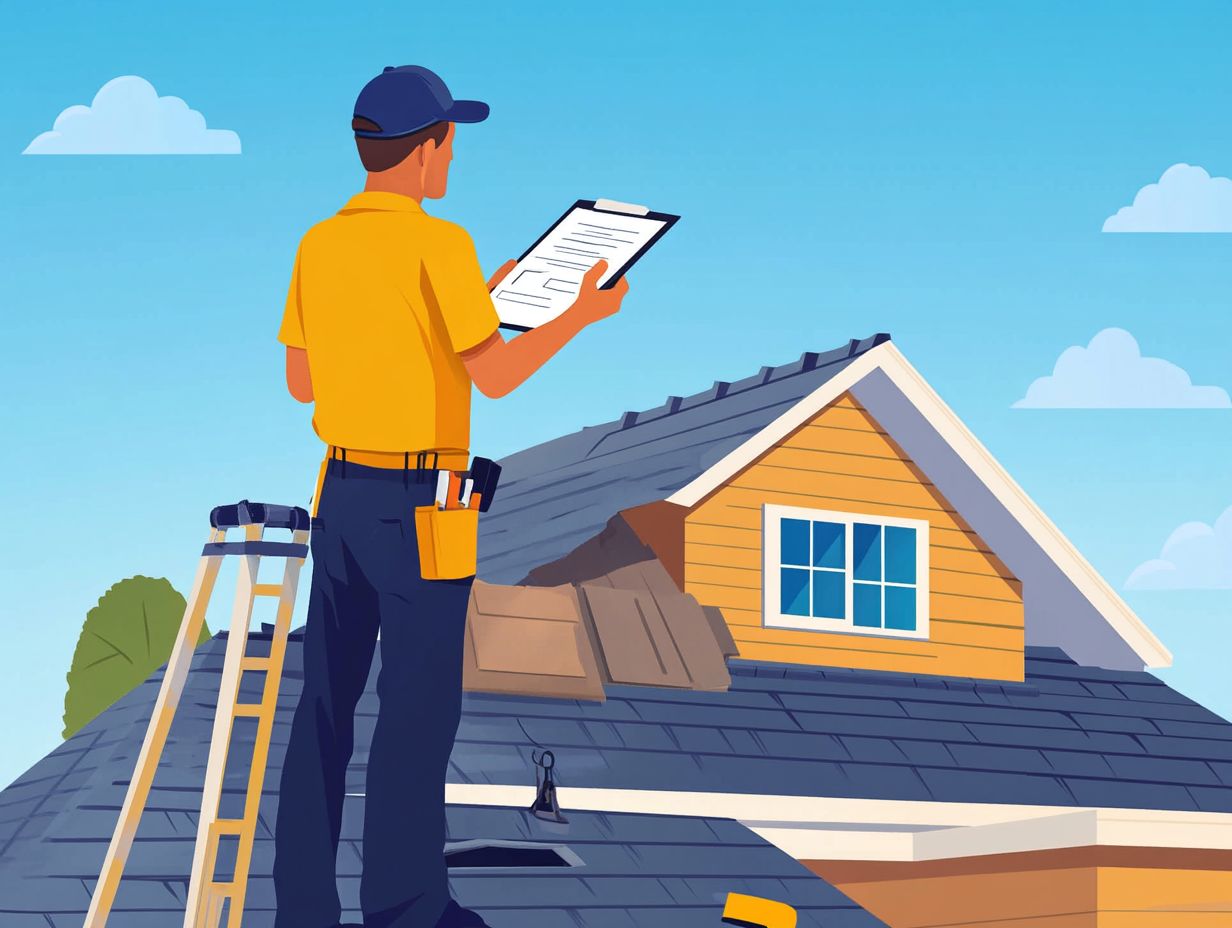
What are the 5 key components of effective home inspections?
- Structural integrity
- Electrical systems
- Plumbing systems
- Heating and cooling systems
- Interior and exterior features
Why is structural integrity an important component of home inspections?
Structural integrity is essential for the safety and stability of your home. A thorough inspection identifies potential issues with the foundation, walls, and roof, which is why you should look for the 5 must-have qualities in a home inspector.
What is included in an electrical systems inspection?
An electrical systems inspection examines the wiring, outlets, switches, and circuit breakers. This ensures that your electrical system is safe and functional.
Why is it necessary to inspect plumbing systems during a home inspection?
Inspecting plumbing systems can uncover leaks, clogs, and issues that may require expensive repairs later on. It’s critical to ensure your plumbing is in good working condition to avoid future problems.
What should be included in a heating and cooling systems inspection?
A heating and cooling systems inspection looks at the furnace, air conditioning unit, and ductwork. These systems must work properly to maintain a comfortable living environment.
What does an interior and exterior features inspection include?
An interior and exterior features inspection covers doors, windows, walls, and ceilings. It also examines the home’s exterior, including the roof, gutters, and siding. To ensure you conduct a thorough check, consider these 5 tips for a productive home inspection.


